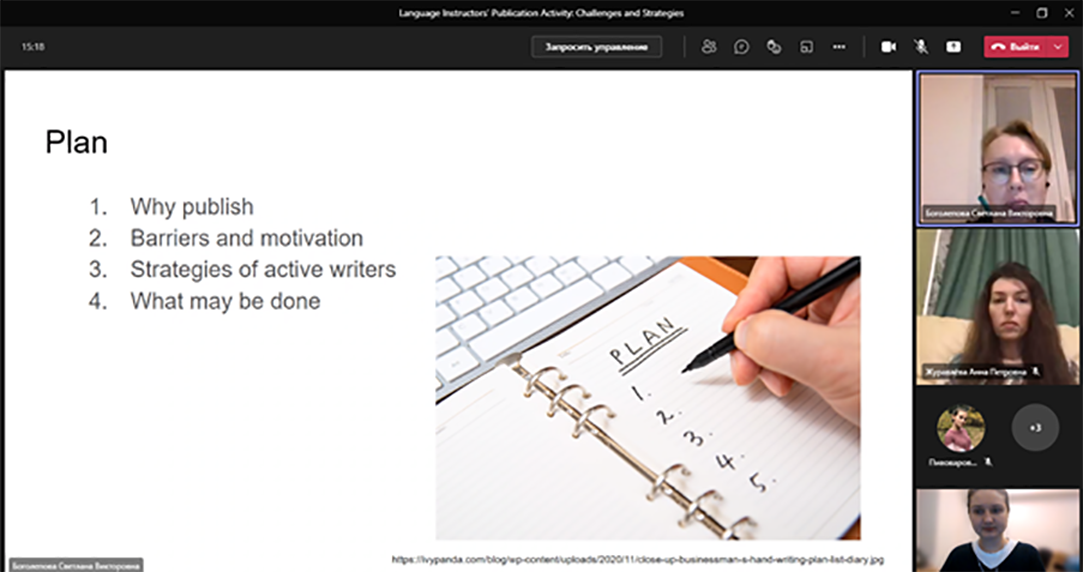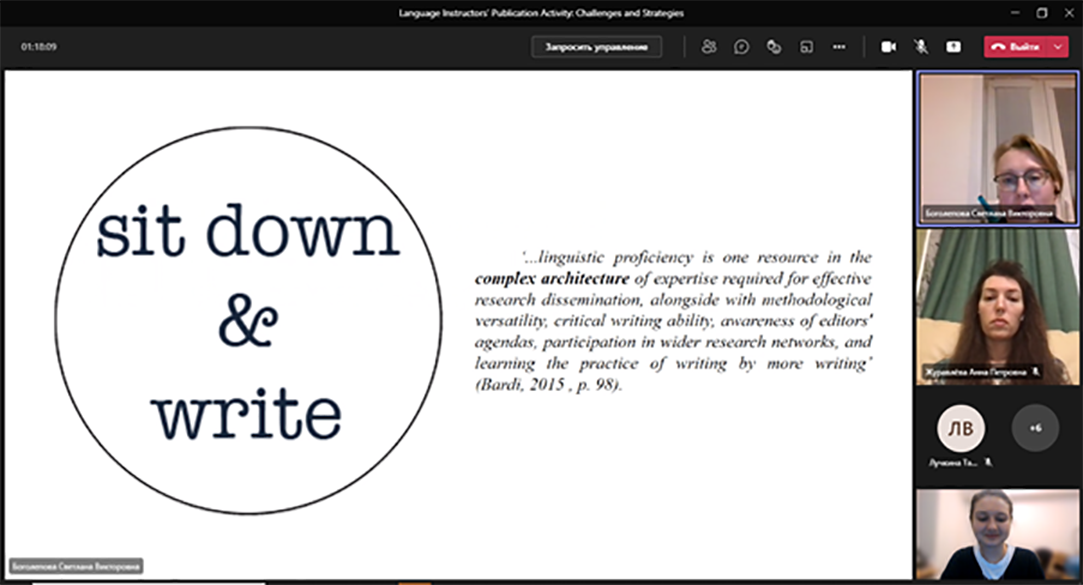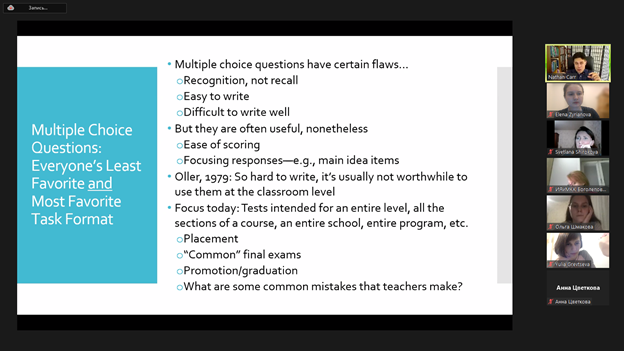Colloquium +
Новая площадка для обмена профессиональным опытом по направлениям деятельности ШИЯ, предназначенная для преподавателей, научных сотрудников, студентов и аспирантов, коллег из образовательных учреждений Москвы и других городов, а также партнёров из зарубежных университетов.
Семинар "Особенности поиска по базам данных научной информации"
Семинар "Публикационная активность преподавателей иностранного языка: барьеры и стратегии повышения"

At the workshop Svetlana Bogolepova shared the results of a survey and interviews among university language instructors and her vision based on these results of what challenges language instructors face and what motivates them to publish. Among many there is a lack of motivation, personal and financial, administrative support, access to materials, and simply interest in academic writing. Lack of research skills may be one of the major barriers for language instructors.
Our guests speculated on their personal barriers to publication activity and outlined a direction of what to focus on for improving the efficiency.
The participants got precious insights from the experience of prolific writers on how publication output can be increased, which overall could be summarised as:
-
establish a daily academic research routine,
-
cooperate with colleagues,
-
use available resources,
-
always learn, even from rejections,
-
and read a lot of published research.
Svetlana Bogolepova encouraged the colleagues to be perseverant as the publication process takes time and effort. The best way to get better at writing is to read and write on a regular basis.

There was a traditional discussion after the seminar in which both teachers and students participated and shared their vision on publication activity. The colleagues talked about their own experience, pains and lifehacks in the publication process.
Семинар «Как опубликоваться в рецензируемом научном журнале. Шаг 2: Работа над статьей»
22 сентября прошел семинар «Как опубликоваться в рецензируемом научном журнале. Шаг 2: Работа над статьей»
Спикер: Чиронова Ирина Игоревна
Также на семинаре были рассмотрены следующие вопросы:
- на что в первую очередь обращают внимание редакторы журналов;
- как создать правильный заголовок;
- как написать хорошую аннотацию;
- как реагировать на замечания;
- и многое другое.
Семинар "Writing Good Test Questions: Principles and Common Mistakes"
Nathan Carr is a professor of TESOL at California State University, Fullerton. He received his PhD in Applied Linguistics at UCLA with a focus on language assessment. Professor Carr’s research interests are eclectic but focus on language assessment, particularly validation, assessment literacy training, computer-based testing, automated scoring, rating scale use and development, and test task characteristics.
For more details about the Conference follow the link.
This seminar reviewed several commonly accepted rules for writing good items (i.e., test questions), focusing on the work of Haladyna, Downing, and Rodriguez (2002). Mr. Carr outlined a number of errors commonly found in teacher-created test questions, particularly multiple-choice items and illustrated them with an abundance of examples. Nathan shared a wealth of materials for the participants to examine several problematic items and identify why they are problematic.
The seminar was especially productive for students who actively took part in the discussion and asked questions.

Семинар "How to get published in a peer-reviewed journal"
28 июня в прошел семинар "How to get published in a peer-reviewed journal".
Спикер: Ирина Игоревна Чиронова
Язык семинара: русский
Данный семинар начал кампанию Школы иностранных языков по повышению публикационной активности преподавателей.
На семинаре были рассмотрены следующие вопросы:
1. Обзор актуальных списков «хороших» журналов. Как разобраться в разных списках, которые постоянно обновляются наукометрическим центром ВШЭ? Для чего предназначен каждый из них?
2. Стратегии выбора подходящего журнала. От правильного выбора журнала во многом зависит вероятность того, что ваша статья будет опубликована. Несмотря на достаточно высокое качество статей, российские исследователи часто получают отказы в публикации. Типичная причина – неправильный выбор журнала, поскольку редакционная политика большинства серьезных зарубежных журналов отличается от принятых у нас стандартов. На семинаре мы поговорим об этих различиях и на примере конкретных журналов посмотрим, есть ли у нас шанс в них опубликоваться.
3. Этапы работы над статьей. Поговорим о правильном структурировании статьи в соответствии с западными стандартами, о языковом оформлении текста и правилах общения с редакционной коллегией иностранного журнала.
Семинар был предназначен для преподавателей Школы иностранных языков, которые в рамках своей научно-исследовательской деятельности планируют публикации на английском языке и в перспективе получение академической надбавки третьего уровня «за публикацию в зарубежном реферируемом журнале».
Семинар "Needs analysis approaches for ESP and ESAP course design"
25 мая в 18:30 состоялся семинар "Needs analysis approaches for ESP and ESAP course design"
Спикеры: Светлана Викторовна Боголепова, Алексей Валентинович Бакулев, Константин Игоревич Хомутский, Татьяна Григорьевна Шихалкина
Adults successfully learn foreign languages if they feel this knowledge can be applied in real-life situations. Currently, university courses do not always take this into account. Still a University is the link between the studies and the professional world. Academia should guide and be guided by the students’ language needs and equip them with necessary tools for life.
This is what both teachers and learners need to consider when working with language acquisition at the University. While courses designers need to comprehend how these needs determine the content of university language courses, namely various kinds of ESP courses.
However, not only language items necessary for this particular audience or field are to be detected for an ESP course, the whole range of needs analysis will finally bring to the mastery of the course content.
Why and what else needs to be counted and analysed you will learn at our seminar, where you will hear about two cases and approaches to designing ESP and ESAP courses.
The seminar has two parts.
Part 1 of the seminar (35 minutes) is devoted to presentation of the course “Advanced English for Humanities” which will focus on accomplishing the above mentioned task within the academic, institutional paradigm.
Abstract: English for Specific Purposes courses are designed in the paradigm "tell me what you need English for, and I will tell you the English that you need” (Hutchinson & Waters, 1987, p. 8). Therefore, EAP courses are based on needs analysis. English for Specific Academic Purposes courses take into account students’ professional and academic needs. In the talk we will go through the stages of ESP and ESAP courses, look at the possible formats of needs analysis, discuss how course materials are designed according to the needs revealed, and show how the materials can be evaluated. The course “Advanced English for Humanities” and the data collected while the course was being designed will provide illustrations for each stage. We will also demonstrate how the design and validation of assessment materials can be integrated in ESAP course design.
Plan:
-
The essence of ESP and ESAP
-
Course design in ESP
-
Needs analysis ESP
-
Subjective, objective and institutional needs: the case of “Advanced English for Humanities”
-
Contextual and pedagogical realisation in ESAP (with illustrations from “Advanced English for Humanities”)
-
Evaluation of course materials
-
Assessment design and validation
Part 2 of the seminar (35 minutes) will tell about the preparatory stages for outlining an ESP course and Professional Profiles as another needs analysis approach.
Abstract: The first thing that comes to your mind when you come across the term ‘English for Specific Purposes’ (ESP) is domain-specific vocabulary. However, it is just the tip of the iceberg. Needs analysis is another cornerstone of ESP course design, which has been evolving over the time. The modern approach to needs analysis is based on the principles of Language and Communication for Professional Purposes (LCPP), which helps to understand what the professional requires in order to perform his/her duties successfully via the analysis of the context of situational communication. This approach has become the base for the Common European Framework of Reference for Professional Purposes, which was transformed into CEF Professional Profiles by Huhta (2013). Consisting of six parts (from A to F) CEF Professional Profile represents a grid, which makes it easier to gain an overview of the communication situations at the workplace. In the talk we will explore the content of Professional Profiles, discuss the methodology, used to obtain data for a certain Professional Profile, and the application of CEF Profession Profile in ESP course design.
Plan:
1. What is CEF Professional Profile?
2. Six Parts of CEF Professional Profile
3. Examples of CEF Professional Profiles
4. How to integrate Professional Profile into the course?
5. Creating your own Professional Profile
Q&A session (20 minutes for questions)
Прочитать интервью со спикерами можно здесь.
Семинар "Как изучают экранизацию?"
18 мая прошел семинар "Как изучают экранизацию?".
Спикер: Виталий Александрович Нуриев (кандидат филологических наук, ведущий научный сотрудник Федерального исследовательского центра «Информатика и управление» Российской академии наук (ФИЦ ИУ РАН), приглашенный преподаватель Российского института театрального искусства – ГИТИС, колумнист Интернет-издания «Горький»).
В своей статье 1959 года «О лингвистических аспектах перевода» Роман Якобсон ввел в научный обиход понятие межсемиотического перевода. Это, согласно его определению, «интерпретация вербальных знаков посредством невербальных знаковых систем». Теоретики экранизации – как отечественные, так и зарубежные – тут же взяли введенное Якобсоном понятие на вооружение и стали его активно использовать в своих работах. Является ли оно сегодня таким же востребованным? В лекции пойдет речь о современных подходах к исследованию экранизации – о том, каковы сейчас основные тенденции в этой области научного знания, с какими другими научными дисциплинами на регулярной основе теория экранизации взаимодействует и как складывается этот полифонический диалог. В ходе лекции мы попробуем ответить на вопросы, почему и зачем изучать экранизацию, а также каким образом это можно делать с учетом нынешнего положения вещей в науке и в мире.
Ключевые слова: художественное произведение, интерсемиотический перевод, художественный перевод, экранизация.
Литература:
Якобсон Р. О лингвистических аспектах перевода // Вопросы теории перевода в зарубежной лингвистике. М., 1978. С. 16-24.
Bruhn J., Gjelsvik A., Frisvold Hanssen E. (eds.) Adaptation Studies: New Challenges, New Directions. New York, London: Bloomsbury Academic, 2013.
Cartmell D. (ed.) A Companion to Literature, Film, and Adaptation. Chichester: Wiley-Blackwell, 2012.
Hutcheon L., O’Flynn S. A theory of adaptation. New York: Routledge, 2013.
Leitch Th. (ed.) The Oxford Handbook of Adaptation Studies. New York: Oxford University Press, 2017.
Leitch Th. Film Adaptation and Its Discontents: From Gone with the Wind to The Passion of the Christ. Baltimore, Maryland: The Johns Hopkins University Press, 2009.
Welsh J.M., Lev P. (eds.) The Literature/Film Reader: Issues of Adaptation. Lanham, Maryland, Toronto, Plymouth, UK: The Scarecrow Press, 2007.
Семинар "Are you open to opposing viewpoints? Tips for improving critical thinking in English classroom using conflictology"
29 апреля состоялся семинар "Are you open to opposing viewpoints? Tips for improving critical thinking in English classroom using conflictology".
Спикеры: Алина Будникова, Рэд Бушетара
At the seminar you will learn how the Intercultural conflict management theory models could be implemented within English language teaching. The models could be indispensable for the analysis of conflicting views and arguments on a certain problem. Namely, the model can promote students’ skill of substantiating their stand, perceive and comprehend other party’s reasoning. Hence, critical thinking is being thoroughly mastered.
At the seminar you will:
- Learn about “Circle of Conflict”, the tool for conflicting situations sources analysis.
- Learn how to use the tool for preparing the students for a more productive development of such language skills as writing, speaking and reading based on Case Study technique.
- Learn how to improve the quality of the students' essays of “Discuss both views and give your opinion” type and make debates and discussions more sensible and multifaceted.
- Practise creating conflict cases aligned with students’ academic and professional interests.
- Discuss other ways of Intercultural conflict management within Foreign Languages teaching.
Прочитать о том, как прошло мероприятие можно здесь.
Семинар "Selected African American Poets from Harlem Renaissance to Our Present Time"
8 апреля прошёл семинар "Selected African American Poets from Harlem Renaissance to Our Present Time".
Спикер: Yasser K. R. Aman
The presentation is mainly based on my book "Modern African American Poets: From Hughes to Parker" which introduces African American poetry from totally new perspectives. The talk will also provide a bird’s eye view on African American theatre and prose. It will cover poets from the Harlem Renaissance to our present time. Race relations and poetry of protest are going to be discussed by comparing woks by Langston Hughes and Countee Cullen, who are introduced from new perspectives, viz., two psychological types: self-acceptance and self-dejection. The talk includes other poets such as Roscoe C. Jamison who represents voices unheard, those poets who were not often read and written about. Ai represents a person of multi-ethnic roots who dissects her society highlighting reasons of violence and sexual hunger. Nikky Finney, a representative of Affrilachian poetry and a political activist, focuses on different social and political issues. The presentation discusses the application of Dual Inheritance Theory on African American Poetry by two poets: Yusef Komunyakaa and Afro German poet May Ayim who was influenced by the African American poet Audre Lorde. It closes with a discussion of Morgan Parker’s ongoing effort exerted for redefining black womanhood.
Selected readings
Семинар "Вербализация агрессии как продукт социально-когнитивной депривации"
12 февраля прошёл семинар "Вербализация агрессии как продукт социально-когнитивной депривации".
Спикер: Лилия Ряшитовна Комалова
Cогласно социально-когнитивной теории, на функционирование личности влияют три группы факторов: поведенческие, когнитивные, средовые. Когнитивные способности человека позволяют ему моделировать возможные изменения внешней среды и адаптировать свое поведение соответственным образом. Можно предположить, что в случае невозможности предсказать средовые изменения человек будет действовать неэффективно, что может повлечь снижение уровня уверенности в своих силах, привести к ухудшению эмоционально-психологического самочувствия человека, привести к смятению чувств. Иными словами, подобная неспособность может стать фрустрирующим фактором. Адаптивный процесс требует выработки определенных реакций на ситуации стресса и фрустрации, и если уйти или конструктивно действовать не удается, то возможной реакцией может стать нападение на фрустратор или стрессор. Одной из возможных форм реакции на различные депривирующие условия реальности может выступать агрессия, в том числе речевая.
Доктор филологических наук, ведущий научный сотрудник отдела языкознания ИНИОН РАН, профессор кафедры прикладной и экспериментальной лингвистики МГЛУ, Лилия Ряшитовна Комалова, представит результаты исследования речевого профиля автора сообщений, речевая продукция которого обусловлена воздействием депривационных факторов и провоцирует эмоционально-психологическое напряжение, а также «заражает» агрессивными установками других участников коммуникации в рамках социальной интернет-сети.
Семинар "Cultural and Linguistic Dimensions of Time"
21 января прошёл увлекательнейший семинар "Cultural and Linguistic Dimensions of Time"
Спикер: Александра Викторовна Нагорная
Dave Barry, a famous humor columnist, wrote, “Aside from Velcro, time is the most mysterious substance in the universe. You can’t see it or touch it, yet a plumber can charge you upwards of seventy-five dollars per hour for it, without necessarily fixing anything”.
Although light in tone, this quote successfully grasps one the most fundamental properties of time – its elusiveness. Lying at the core of human experience and largely shaping our existence, time does not provide us with any material content which would make it tangible. We can only get a very indirect, “roundabout” access to time as an ontological entity through observing changes, ranging from very obvious cyclical daily and yearly rhythms to subtle and gradual transformations of our bodies throughout our lifetime. Devoid of a specific referent in objective reality, time is construed logically, and as any construal, is shaped by a variety of environmental factors, chief among them being the specific culture that generates notions of time and imposes them on its representatives.
At our seminar, we are going to explore some of the multiple dimensions of time which are the most relevant to the contemporary British and American culture and see how they are represented in the English language. We are going to move along the lines of a complex conceptual matrix and consider linear and circular time, social and individual time, sacred and profane time, accelerating and decelerating time. We will take a critical look at the contemporary ‘hustle culture’ which turns us into ‘speedaholics’ and reveal a hidden, but increasingly important, dimension of time – slowness.
Прочитать о том, как прошло мероприятие можно здесь.
Лекция по контент-маркетингу
28 ноября 2020 г. в рамках проекта Colloquium+ прошла лекция по контент-маркетингу
Спикер: Надежда Назарова
Маркетолог. Консультирует компании по выводу на международные рынки, продуктовому маркетингу и конкурентной разведке для бизнеса.
Повышала квалификацию: CMI - content marketing institute, США
Harvard - disruptive strategy course, США
Содержание лекции:
Интернет открыл новые возможности свободной публикации и распространения контента для огромной аудитории, но изменил правила создания контента. Современным авторам уже недостаточно подобрать кричащий заголовок и создать интересный материал. Теперь нужно сделать так, чтобы материал нашел своего читателя и не затерялся среди миллионов других текстов.
При создании контента приходится учитывать конкуренцию в теме и требования поисковых систем - SEO.
Слушатели узнали:
1. В чем разница подходов к написанию текстов в России и США.
2. Особенности формирования структуры отделов контент-маркетинга.
3. Как связаны контент и SEO-оптимизация.
4. Какие существуют подходы к описанию и исследованию аудиторий.
5. Какие инструменты помогают создавать контент.
Нашли опечатку?
Выделите её, нажмите Ctrl+Enter и отправьте нам уведомление. Спасибо за участие!
Сервис предназначен только для отправки сообщений об орфографических и пунктуационных ошибках.